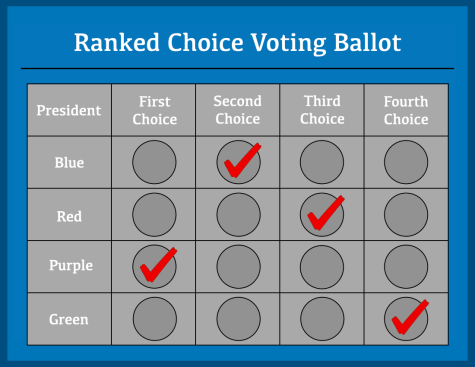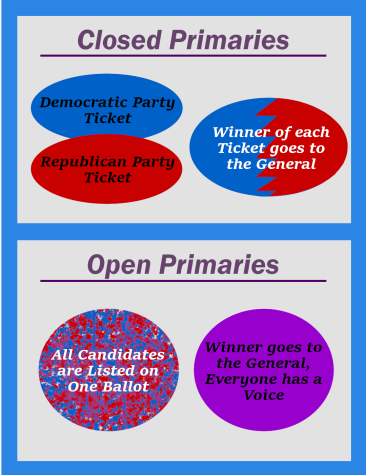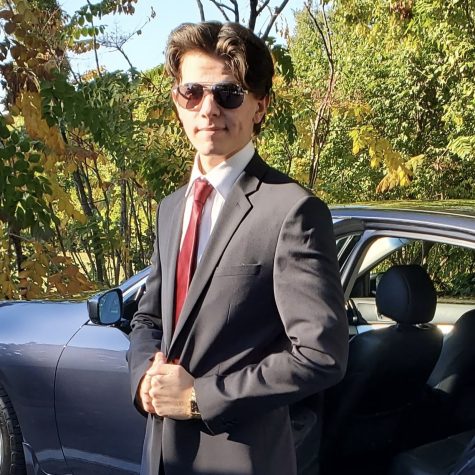It’s Time to Move on From the Self-Destructive Duopoly
June 8, 2022
Editors Note: “It’s Time to Move on From the Self-Destructive Duopoly” by Christian Movick won second place in the National Coverage category at the 2022 OSIE Awards in the United States Organization of Students Editors. Click here to view the award.
Are you tired of voting for the lesser of two evils in elections? Although the duopoly is something that we’re all used to, we must replace the duopoly with more than two parties that actually have a fair chance in elections.
The way things are set up now incentivizes politicians to pander to extremes while both parties become more extreme themselves, all the while the majority of Americans are independents and feel left behind.
The best way we can solve these issues and also improve the way of life and process of elections in America is through two things: Ranked-choice voting and open primaries.

Ranked-choice voting, if implemented on a national level, would replace the electoral college.
When you go to vote, instead of only voting for one candidate, you can rank the candidates from your most to least favorite.
Then, if a candidate has not reached over 50% of the vote, which has become increasingly more common in elections, then the candidate with the least amount of votes is eliminated.
Voters who picked that candidate as their first choice would have their votes count for their second choice.
This process continues until someone wins over 50% of the vote.

To understand how open primaries work, it would be helpful to understand how closed primaries work.
Closed primaries are where you can only have the Democrat ballot or the Republican ballot. You may not really vote for the candidate you want if the candidate(s) you wanted to vote for is on the other ballot.
For example, someone might be a Democrat but like one of the Republican candidates better, or vice versa.
Currently, most places in America have closed primaries.
With open primaries, all candidates would be required to be on one single ballot, regardless of what political party they identify with.
Just recently, a ballot initiative gathered enough signatures in order for it to be on the Missouri ballot this November during the midterms. If the “Better Elections Amendment” were to be passed, it would implement both ranked-choice voting and open primaries across the state.
While some argue that ranked-choice voting could decrease the number of voters due to a need to research, voters should be researching the candidates on their ballots anyway. The outcome of this would have a more positive effect on American elections rather than a negative one.
Open Primaries would actually result in a higher voter turnout rate rather than a lower one.
The problem with closed primaries is that it can feel like a choice between the lesser of two evils.
With Ranked-Choice Voting, it would allow for more representation of different parties.
Over 60% of Americans say they want a new party and say that both parties are out of touch.
In addition, in January of last year, 50% of Americans considered themselves to be independent.
Many independents feel that if they vote for a third party, they’re “wasting their vote.” This feeling could be eliminated with Ranked Choice Voting.
By having more political parties with an equal chance, it wouldn’t be as much of a problem if a political party was falling into bad leadership, because there would be other options.
It would also reduce the chances of America becoming susceptible to Authoritarianism. By only having two political parties, if one party becomes under the influence of Authoritarianism, then the chances of America becoming under that influence would be high as well.
With more political parties in America, if one party became under the influence of Authoritarianism, then there are still other options rather than the duopoly we have now.
Other places in the world such as France, Denmark, Germany, and European Union nations have this style of voting, but America is behind. With only two major parties, we are sewing more polarization into the system and hearts of Americans.
Open primaries make sense for a wide variety of reasons. Everyone should be able to choose which candidate they wish to vote for, regardless of if they are a Democrat or a Republican.
In addition, a lot of places are either really red or really blue.
For example, take a look at New York City. A Republican doesn’t have too much of a chance of getting by in the election with its current political climate, so if you don’t vote from the Democratic ballot, then it’s almost as if the election happens without you.
Not only that, but many politicians are also incentivized to pander to extremes in our current political climate because they are largely worried about getting primaried within their own party.
An example of this happened in Alaska.
In the 2020 election, Alaskans voted to implement both ranked-choice voting and open primaries. When Donald Trump was impeached for the first time, Alaska’s Republican Senator Lisa Murkowski voted not to convict Donald Trump.
Despite that, when Donald Trump was up for impeachment once again after the January 6 capital attack in 2021, Murkowski did vote to convict him.
In this case, Lisa Murkowski didn’t need to be worried that the Republican party, which was largely under the influence of Donald Trump, would primary her, because she could now focus on voting for how she truly felt and representing all of her people rather than just the extremes of her party in order to get reelected.
Over the past few years, open primaries and ranked-choice voting have become increasingly popular. A large reason this could be is because of a particular candidate that ran as a Democrat in the 2020 election.
Andrew Yang campaigned largely for ranked-choice voting and open primaries, however, he is mostly known as the candidate that supported Universal Basic Income for all Americans.
Since then, he has left the Democratic Party and formed his own political party, the Forward Party, where his main goals are to implement these two policies.
Implementing ranked-choice voting and open primaries across the country would:
-
Remove incentives that cause politicians to pander to extremes
-
Make citizens feel better represented
-
Allow voters to have choices
-
Make citizens not feel as upset about the outcome of an election
-
Allow third parties to have better opportunities
-
Allow other parties to have more of an opportunity in a deep red or deep blue area
-
Increase the chance of higher voter turnout; removes the lesser of two evils
-
Make America less susceptible to Authoritarianism
U.S. History and Sociology teacher Mr. Patrick said that he felt ranked-choice voting would make people more likely to vote third party because “you begin to kind of know you’re still casting your vote, it’s still going to count, and it allows you to say who it is that you really want.”
Mr. Patrick also said he felt it would make people more likely to vote overall because he says “some of those people who feel that their vote doesn’t matter or doesn’t count, I think that they will begin to vote more and be more participatory.”
A new poll conducted by the Harvard CAPS-Harris Poll found that roughly 58% of Americans already say that they may vote for a third-party candidate in the 2024 presidential election if it were to be a Trump vs Biden rematch.
“That seems about right,” Mr. Patrick said. “I mean, you know we’re probably placating to the furthest 10% on each side.”
“People are tired of this and they’ll support something else, especially if they think that it has an opportunity to really change or do something, so I think that’s gonna happen,” he added.
Mr. Patrick also spoke about what he thought of the Forward Party, and if he thought it could be a viable political party in the future.
“I think so. I think that one of the major obstacles is getting over the UBI (Universal Basic Income) hurdle,” he said.
“It’s a breath of fresh air for people that are tired of what’s been going on the past however many years. This isn’t just a Trump thing, this isn’t a Biden thing, this isn’t an Obama thing, Clinton, it goes back further than that. And people are tired, and they’re ready for a breath of fresh air.”
Junior Nolan Ballard said that he felt that ranked-choice voting would “prop up third parties because of how it works.”
“A party like the Green Party or Libertarian Party gets less than 10% of the votes currently, but with ranked-choice voting, there will be a larger incentive to have diverse ideas,” Ballard said.
Ballard also felt that open primaries would help candidates better represent their people and wouldn’t only be campaigning on the minority of people that they govern.
“If people on the right have to campaign to the people on the left and vice versa, then there would be less extremism, and more common ground. With less of the extremes, the average person would be closer in thought to their representative, even if they belong to a different party.”
“Although ranked-choice voting is more complicated than traditional voting, it doesn’t hinder the process of voting and is well worth implementing,” Ballard added.
“[The duolopy] continues to drive a wedge in between our people,” senior Sophie Faasen said. “We need people with all different opinions. Each political party, including third parties, have a piece of the puzzle. We need to come together and work things out.”
By having both ranked-choice voting and open primaries, we can change the incentive for politicians to truly represent all of their people, regardless of party, and not have to pander to extremes.
The facts are that these things would make the country less susceptible to authoritarianism, make voters more likely to be more satisfied with the outcome of elections, help in depolarizing the nation, and make people’s voices more heard.
The “Better Elections” amendment will be on the ballot for Missouri this November during the midterms, which would institute ranked-choice voting as well as open primaries if passed.


Emily Jacobi – Jun 10, 2022 at 1:57 pm PattonvilleTODAY Pick
Excellent, informative article. Key to success seems to be a well informed electorate. People need to learn how to research candidates and take voting seriously.